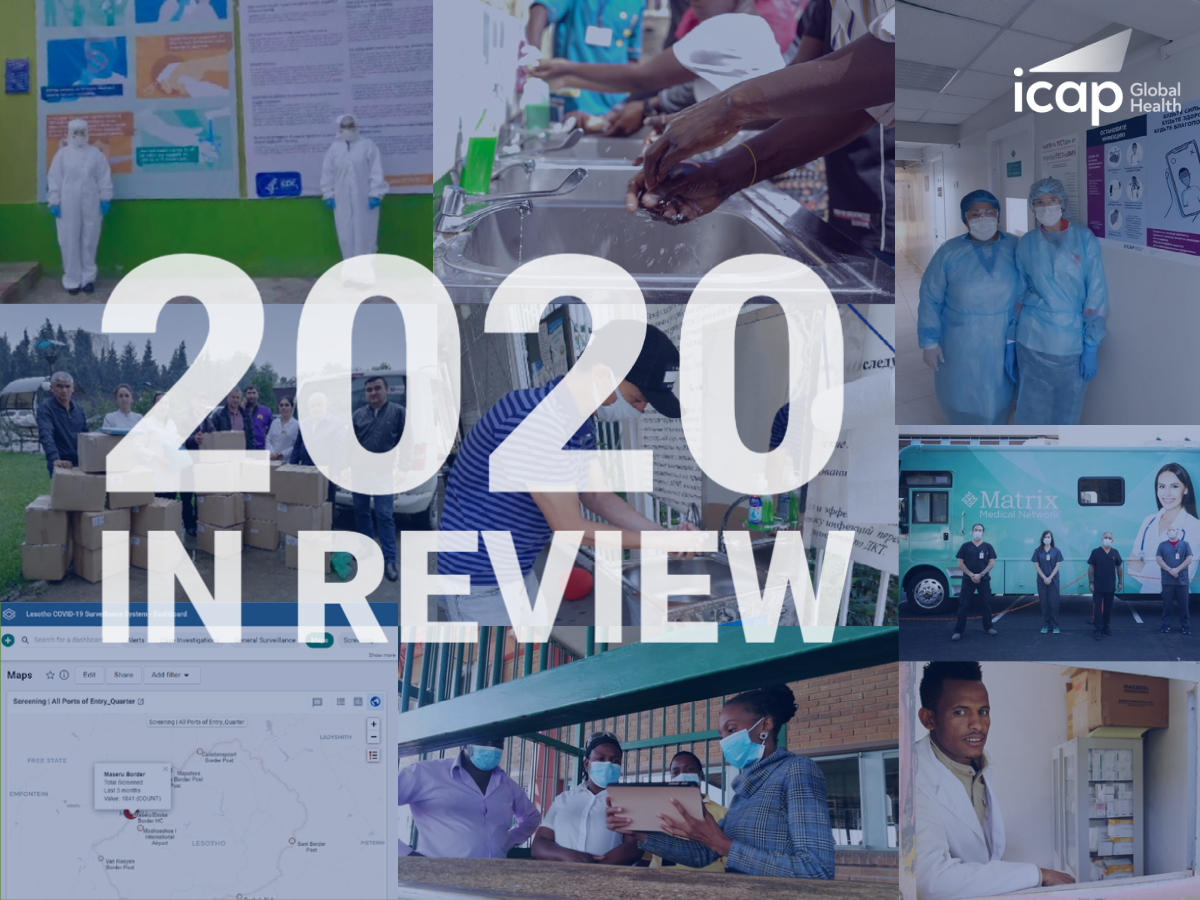2020 marked an extraordinary year in global public health – the emergence of the ongoing COVID-19 health crisis has brought into focus the importance of strong, resilient health systems and, for ICAP teams around the world, the increased urgency of our mission to transform the health of populations through innovation, research, and global collaboration.
The COVID-19 pandemic has led to a dramatic loss of human life worldwide and presents an unprecedented challenge to public health, while the economic and social disruption caused by the pandemic has been devastating as well. From the onset, ICAP quickly moved to assist national ministries of health in developing and implementing response plans, while at the same time working on the ground to help health workers and health facilities prepare to address a new and often deadly disease—helping to set up laboratories and isolation units, conducting surveys to assess the infection’s spread, procuring personal protective equipment (PPE), training frontline workers on infection prevention and COVID-19 diagnosis and management, and participating in vaccine development. While working nonstop to support COVID-19 response efforts in 30-plus countries of operation, ICAP also worked with partners across national, subregional, and local levels to reorganize and safely maintain access to high-quality, essential health services in the pandemic context.
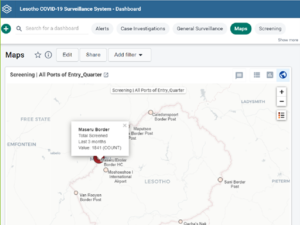
Geo-spatial presentation of data captured at an earlier stage of the country’s COVID testing campaigns.
Tracking the COVID-19 Pandemic in Real-Time
In close collaboration with ministries of health from Angola to Zimbabwe, ICAP field teams worked to support the establishment of national command centers and data dashboards and introduced innovative virtual approaches to maintaining strong health care systems in the face of the dramatic challenges presented by the pandemic. ICAP worked to help bolster the capacity of ministries of health to monitor, evaluate, and track the spread of COVID-19 and address hot spots where transmission rates are high. Systematically collecting, interpreting, disseminating, and using data—through surveys or surveillance—can play a key role in understanding where progress has been made and where gaps remain.
To guide rapid COVID-19 response, ICAP supported the expansion and strengthening of surveillance systems in seven countries as well as five COVID-19 related surveys. One notable example of this work includes the development of a customized a COVID-19 data analytic and visualization platform for the ministry of health in Lesotho. In just under 72 hours, ICAP staff built a suite of data collection, monitoring systems, and training materials to support Lesotho’s national COVID-19 response, allowing public health officials to view outbreak patterns in real time. The COVID tracking system pulled together patient intake forms and geo-spatial data for all border posts, villages, and health facilities into easy-to-read data summary dashboards, similar in feel and function to information systems previously developed. In Zimbabwe, ICAP supported and strengthened contact tracing and COVID-19 surveillance activities by incorporating an electronic health record system in all the country’s main travel entry points to alert health care workers of possible COVID-19 infections in the community.
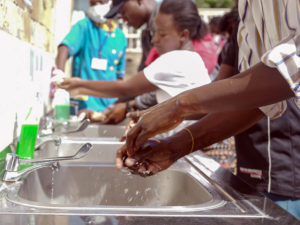
Handwashing station at the Jaramogi Oginga Odinga Teaching and Referral Hospital (JOOTRH) in Kisumu, Kenya.
ICAP worked in close partnership with ministries of health to protect health workers and their patients through both trainings of frontline responders and directly supporting the implementation of infection prevention and control (IPC) measures in partner facilities. In a matter of weeks after the onset of the pandemic, ICAP launched health worker training programs in 16 countries to provide frontline health workers with critical training in COVID-19 case identification and management, triage care, IPC measures, and improved patient communication strategies. Furthermore, ICAP experts in critical COVID-19 IPC measures directly guided clinic teams in the implementation of integrated safety precautions and protocols at health facilities including the establishment of mobile handwashing stations, the creation of well-ventilated waiting areas with adequate space to social distance, institutionalizing correct and consistent donning and doffing of health worker PPE, and the distribution of easy-to-understand communications materials with important health information for patients. In Sierra Leone, COVID-19 triage stations and a newly renovated COVID-19 screening center were rapidly assembled at the King Harman Hospital in Sierra Leone with support from ICAP. At Western Kenya’s largest referral hospital and longtime partner Jaramogi Oginga Odinga Teaching and Referral Hospital (JOOTRH), ICAP developed and supervised the implementation of COVID-19 infection, prevention, and control (IPC) protocols, including the institutionalized use of hand-washing stations and symptom screening checkpoints.
Procuring Protective Equipment for Health Facilities
As rates of infection escalated around the world in early 2020, frontline health workers were particularly vulnerable to infection due in part to an over reliance of just-in-time inventory management systems –designed to cut costs by eliminating stocks of critical supplies on-site. In response to surging cases, the market for PPE faced both a dramatic production shortfall, with PPE production output in China severely restricted due to COVID-19-related closures, and spikes in demand for PPE. In short, PPE was least available and accessible when frontline health workers needed them the most.
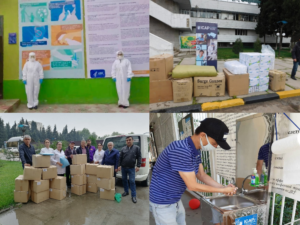 In Tajikistan, ICAP purchased respirators, medical masks, disposable gloves, protective suits, and hand wash basins for the country’s national HIV/AIDS and narcology center. |
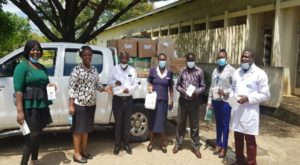 Health facility workers in Kenya receive critical supplies — including non-contact thermometers, cleaning supplies, and other PPE — to protect clinic workers as they care for patients through the fund. |
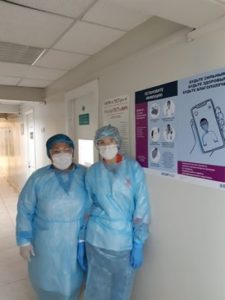 Frontline health workers pose in front of patient-facing posters used to describe the basic symptoms of COVID-19 and promote mitigation measures at the East Kazakhstan Oblast AIDS Center.
|
To address this shortage, ICAP secured hundreds of thousands of masks, gloves, face shields, and other PPE for health workers in more than a dozen countries. In addition to PPE purchases, ICAP procured and distributed medical diagnostic and treatment devices for patients with COVID-19 including pulse oximeters, thermometers, and respirators – to health facilities across Africa and Asia.
Producing COVID-19 Health Messaging for Patients and Community Outreach
Reaching out to communities directly is critical in order to provide accurate information, address myths and misconceptions, and overcome stigma associated with COVID-19. In Sierra Leone, ICAP launched mobile health brigades to bring critical information and services closer to communities and individuals through a combination of “pop-up” venues in open spaces, tents, and mobile clinics. Meanwhile in Zimbabwe, ICAP produced a song titled “Apart/Together – We Stand Strong Against COVID” with renowned Zimbabwean musicians Albert Nyathi and Dereck Mpofu. The song was a unique approach to disseminating critical health messaging about COVID-19 while providing a message of hope for communities across Zimbabwe.
ICAP also distributed COVID-19 poster toolkits to promote IPC measures to the general public in clinic settings, describe basic symptoms of COVID-19, and direct patients to locally available resources.
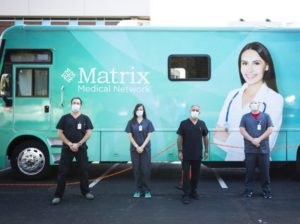
At ICAP’s Bronx Prevention Center and Harlem Prevention Center, ICAP leveraged experience in vaccine development and deep ties to the local community to support COVID-19 treatment research and community outreach activities, like the mobile health station pictured here.
Driving COVID-19 Research Forward
As the coronavirus pandemic threatened the health and lives of people around the world, ICAP marshalled the resources of its two renowned research centers in New York City to fast-track critical research into the treatment and prevention of COVID-19. ICAP’s Bronx Prevention Center and Harlem Prevention Center built on their long history of conducting world-class HIV and tuberculosis clinical trials and deep ties to multi-ethnic communities of New York City to launch two phase III clinical trials in support of the unprecedented public-private sector research efforts to develop COVID-19 vaccines. At the Bronx Prevention Center, ICAP participated in AstraZeneca’s Phase III double-blind, placebo-controlled study to assess the safety, efficacy and immunogenicity of the vaccine compared to a placebo. At its Harlem Prevention Center, ICAP participated in the massive ENSEMBLE study, testing the only single-dose vaccine in development in the United States at the time. The trial involved more than 50,000 volunteers over age 18, with significant representation of people over the age of 60. ICAP’s clinical trials contributed to of an understanding of how the AstraZeneca and Janssen vaccines compared to other vaccines in development by Moderna and Pfizer. Additionally, both the Bronx and Harlem Research Centers also participated in a study for Regeneron Pharmaceuticals to assess the safety and efficacy of a one-time subcutaneous infusion of monoclonal antibodies in preventing COVID-19 in household contacts of individuals infected with SARS-CoV-2.
Building Surveillance Systems to Monitor the Pandemic in Real-Time Around the World
Recognizing the urgent need to better understand the trajectory of the COVID-19 pandemic in real-time, ICAP rapidly ramped up SARS-CoV-2 surveillance efforts to expand national capabilities to better understand where, and among whom, recent infections are occurring. In the United States, ICAP is part of the Community Prevalence of SARS-CoV-2 (COMPASS) study, which aims to estimate the percentage of people affected by SARS-CoV-2, the virus that causes COVID-19, in selected communities in the United States. Funded by the COVID-19 Prevention Network (CoVPN), this study is being conducted across 18 sites nationwide and aims to include more than 70,000 adults and children. The results of this study will guide mathematical models of disease progression and inform innovative testing strategies for COVID-19. Also within the U.S., ICAP is spearheading a large survey to gain insights into the multi-dimensional impacts of COVID-19 on senior citizens residing in New York City. Known as SARS-CoV-2 Impact on Lives and Views of Elderly Residents (SILVER), the study will aggregate qualitative data on the physical, emotional and economic impacts of the COVID-19 pandemic through the lived experiences of almost 800 senior residents. Collected data will be shared with NY Department of Health to inform community outreach and intervention activities. In Malawi, ICAP is partnering with the ministry of health and the U.S. Centers for Disease Control and Prevention (CDC) to conduct a smaller scale sentinel surveillance activity, which will determine the community burden of disease through sampling of 8,000 individuals from eight districts in the country. In Lesotho, ICAP is implementing a cellphone-based COVID-19 surveillance system, leveraging successes from earlier work conducted as part of the 2019-2020 Lesotho Population-based HIV Impact Assessment (LePHIA) survey.
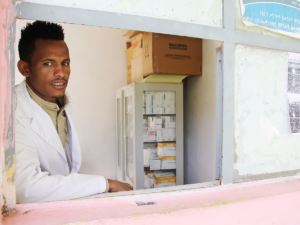
At the ICAP-supported Dessie Referral Hospital in Ethiopia, health care workers get ready to give out at least six month’s supply of life-saving medication to recipients of care as part of a country-wide multi-month scripting pilot project.
In the face of major supply chain disruptions and limits on travel as a direct result of the ongoing COVID-19 pandemic, people on treatment for HIV are at significant risk of being unable to continue their lifesaving treatments. Modeling by the World Health Organization estimates that a six-month disruption of antiretroviral therapy could lead to more than 500,000 additional deaths from AIDS-related illnesses in sub-Saharan Africa over the next year. In the face of this mounting emergency, ICAP has worked diligently to secure supplies of medications for HIV and services for pregnant women and children in a host of countries dealing with both HIV and COVID-19.
One example of this work includes the expansion of multi-month scripting, or MMS, at health facilities in Ethiopia specializing in the treatment of people living with HIV. The model, which was piloted in six health facilities in Ethiopia, gives stable patients the option of shifting from quarterly to bi-yearly ART refill appointments. After a pilot phase in early 2020, ICAP and the Ethiopian Ministry of Health expanded the program nationally. At time of publication, over 162,000 clients have been enrolled on twice-yearly MMS in more than 1,000 sites throughout the country.
Using Innovative Approaches to Save Lives
ICAP’s Coverage, Quality, and Impact Network (CQUIN), which usually facilitates experience-sharing and peer-to-peer learning activities focused on scaling up quality differentiated HIV care and services, leveraged its resources to foster the exchange of lessons learned from adaptations to differentiated service delivery (DSD) during the ongoing pandemic. CQUIN launched a special DSD and COVID-19 webinar series, and a dedicated social media group to promote the real-time exchange of questions and resources among CQUIN member countries and other stakeholders.
As the COVID-19 pandemic spread in sub-Saharan Africa, many CQUIN member countries made significant policy changes to their DSD models to protect recipients of care. In Eswatini, the Ministry of Health implemented multi-month scripting for adolescents during a national state of emergency just at the onset of the pandemic. In Liberia, COVID-19 restrictions prompted the adoption of a home-based antiretroviral therapy delivery model for recipients of care who could not visit facilities.
Across member countries, the most common adaptation was the expansion of multi-month scripting (MMS) to reduce the frequency of health facility visits. At an ICAP-supported facility in the Kyrgyz Republic, this approach was adapted to help ensure methadone patients were able to continue their treatment regimens throughout the COVID-19 pandemic. Prior to this initiative, patients taking home more than a three-day supply of methadone were required to meet strict eligibility criteria set by the Ministry of Health. However, as part of COVID-19 preventive measures, all medication-assisted therapy (MAT) clients in Kyrgyzstan are now permitted to take medication home while adhering to social distancing measures, thanks to ICAP’s recommendations to the Ministry of Health’s Republican Narcology Center (RNC).
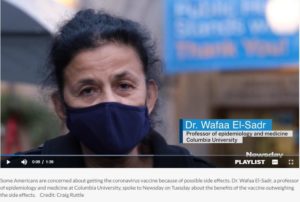
Wafaa El-Sadr, ICAP’s global director in an interview with Newsday, one of the many media outlets ICAP senior staff have shared their expertise in pandemic response.
From the early days of the pandemic, ICAP’s senior leadership have been in regular contact with officials at all levels of government and media outlets around the world, offering evidence-based advice and commentary on questions such as the potential spread of infections, when to open and close schools and businesses, and how to help those most vulnerable to the virus. Coverage highlighted ICAP’s role as a thought leader in global health in best-of-class media outlets including The New York Times, NPR, CNN, MSNBC, Al Jazeera, The New Yorker, and The Guardian.
Looking to the Future
As the world begins to chart a path to a new, post-COVID-19 normal, ICAP is leveraging its extensive expertise in large-scale public health interventions to enable our partners – including ministries of health, research organizations, large multilaterals, health care providers, and patients – to navigate the ongoing state of emergency with an eye on helping save lives and eventually bringing this global health crisis under control.
—
A major global health organization that has been improving public health in countries around the world for over 15 years, ICAP works to transform the health of populations through innovation, science, and global collaboration. Based at Columbia University in New York City, where it is part of the Mailman School of Public Health, ICAP has projects in more than 30 countries, working side-by-side with ministries of health and local partners to confront some of the world’s toughest health challenges. Through meaningful research, tailored technical assistance, effective training and education programs, and rigorous surveillance to measure and evaluate the impact of public health interventions, ICAP aims to realize a global vision of healthy people, empowered communities, and thriving societies.


